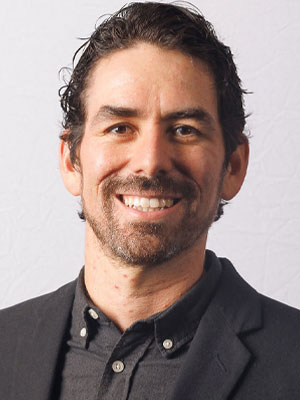Meet our new faculty: David J.X. Gonzalez

- Discipline: Environmental Health Sciences
- Research interests: How extractive industries (such as mining) and climate-driven disasters impact public health and lead to health disparities
- Hometown: Nipomo, California
- Current City: Oakland
- Hobbies: Mountain biking, swimming, baking, and gaming
In July 2023, Berkeley Public Health welcomed new assistant professor of environmental health science David J.X. González. Dr. González received his PhD in environment and resources from Stanford in 2021; his MS in epidemiology from Stanford in 2018; his MESc in environmental science from Yale in 2015; and a BS in ecology and evolution from UC Davis in 2011. We asked him about his work and hopes for the semester.
Berkeley Public Health: Where did you live and work before joining the UC Berkeley School of Public Health?
David J.X. Gonzalez: I’ve been living in the Bay Area since 2016, and I moved to Oakland in 2020 when I was finishing my PhD. Before starting as a professor here, I was a postdoc here at UC Berkeley with Professor Rachel Morello-Frosch.
What drew you to work and teach at UC Berkeley? Are there any researchers here who you really wanted to work with?
The Sustainability and Health Equity Lab, where I did my postdoc, has been leading the way with policy-relevant environmental health and justice work for a long time. And they’re not alone: Groups across campus are partnering with communities, doing rigorous environmental justice research, and developing new methods. That’s what makes me so excited to stay on as a member of the faculty and deepen my connections, both with environmental justice organizations across California and the students and researchers at UC Berkeley.
What are you currently working on?
My research explores how energy production and climate-driven disasters affect maternal and infant health and exacerbate health disparities. I focus on issues that disproportionately impact marginalized communities, and the overall aim is to do work that will lead to interventions to improve health.
For example, my colleagues and I have been studying whether people living near oil and gas wells in California have higher risk of health outcomes like preterm birth, birth defects, and COVID-19. In our work and others’ work, we are seeing consistent evidence that there are health risks associated with living near wells. That leads to more questions: what about living near wells is harmful? We’re looking into that too, and finding that drilling and operating wells increases concentrations of certain air pollutants.
We’ve also heard communities’ concerns that wells are more likely to be drilled in Black, Latino, and low-income communities. We’re quantifying those disparities, and also looking into the factors that lead to those disparities, such as policies like redlining.
Moving forward, I’m interested in partnering with communities to look into the health impacts of idle wells, or wells that are not in active production but that may still be leaking harmful pollutants.
In other work, my colleagues and I are looking into whether wildfire smoke increases health risks for birthing people and infants. There are some persistent racial disparities for maternal and infant health, and I think it’s important to understand whether climate-related exposures, like wildfire smoke, are making things worse.
I’m also looking at the intersections of energy production and climate change, and finding that there are increasing risks of wildfires in areas where oil and gas wells are drilled and operated. All of this research has some obvious policy implications, so we also do the work of communicating our findings to affected communities (in both Spanish and English) and policymakers, in addition to our scientific colleagues.
What are your hopes going into the fall semester?
So many. I’m looking forward to integrating into the Berkeley Public Health community, getting to know my new colleagues and incoming students. I’m excited to work with students and assemble a group looking at the intersections of climate change and structural determinants of health. I’m interested in building up the capacity to do more science communication in Spanish, particularly since many of the issues we study disproportionately impact Spanish speakers. There’s a lot of work to do, and this is a fantastic institution to do the work and, hopefully, make an impact.